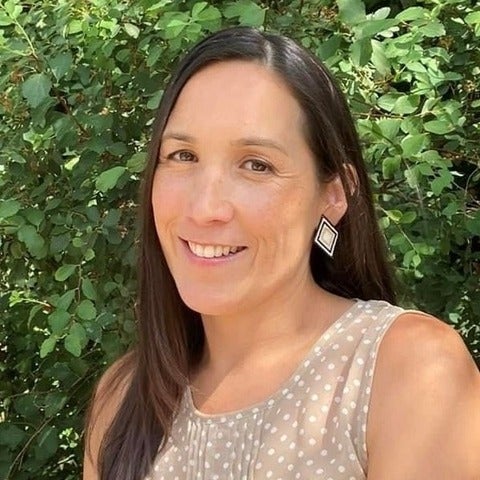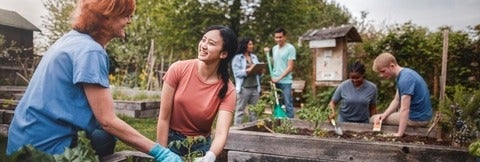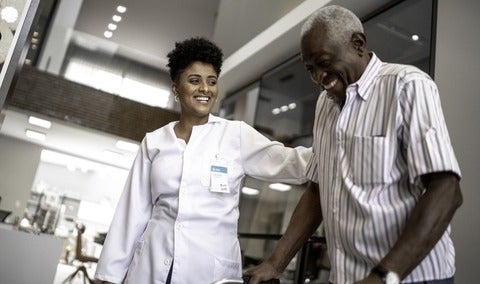Public health researcher awarded more than $3.5 million
Dr. David Hammond, a researcher in the School of Public Health Sciences, received more than $3.5 million from the latest CIHR Project Grant program for his project on national-level food policies.
Mercury exposure in northern communities linked to eating waterfowl
Research highlights omega-3 benefits of waterfowl and fish while confirming mercury intake in northern Indigenous communities.
What drives sleep problems in long-term care facilities?
University of Waterloo researchers find that residents’ poor sleep can trigger problematic medication use, falls and delirium.
Think your BMI reflects your health? Think again, study warns
With new data showing two in three Canadians are overweight or obese, a University of Waterloo study cautions against using BMI.
How a blood test can aid spinal cord injury recovery
Waterloo study shows routine blood samples may give doctors early insights into injury severity and patient survival after spinal cord damage.
Stress in the strands: Hair offers clues to children’s mental health
New research shows long-term stress levels, measured through hair samples, may provide important clues about mental health risks in children with chronic physical illnesses.
Dr. Troy Glover ranked most influential scholar in social capital field
Recreation and Leisure Studies Professor Troy Glover was recently recognized as the top scholar in the field of social capital, based on total publications, citation impact, and both h-index and g-index in a recently published systematic review.
Waterloo researchers awarded more than $1 million for dementia research
Faculty of Health study aims to improve the quality of life for people living with dementia in ethno-racial communities
Female pilots perform better under pressure, study finds
New research challenges gender bias in aviation performance using eye-tracking technology and flight simulation
Waterloo researchers awarded more than $4.5 million
From advancing the government’s “tobacco endgame” to improving life experiences for older adults, Waterloo researchers are improving health futures.
Raising awareness of extreme indoor temperatures
Researchers use thermostat data and AI to identify households most at risk.
Improving heatwave resilience in the Waterloo community
Irfhana Zakir Hussain has been awarded a prestigious Vanier Canada Graduate Scholarship for her work on predicting and preventing extreme heat crises.
People diagnosed with dementia are living longer, global study shows
Researchers find earlier diagnosis and better care may lead to lower risk of death than in previous years, following dementia diagnosis.
Structured exercise significantly improves survival in colon cancer patients
Landmark study is a collaboration between Canadian Cancer Trials Group, WRHN and UW WELL-FIT program.
Study: Loneliness doesn’t raise mortality risk
Research challenges link between loneliness and mortality for older adults receiving home care.
From puck drop to brain pop
New study from Spectator Experience and Technology Laboratory shows how a hockey fan’s brain reacts to key moments in games.
Q and A with the Experts: Measles
Dr. Zahid Butt discusses risks and protections as disease once eliminated in Canada makes a comeback
Dr. Lora Giangregorio named Canada Research Chair
Kinesiology and Health Sciences Professor Lora Giangregorio has been awarded a Tier 1 Canada Research Chair (CRC) in Bone Health and Exercise Science, with a funding allotment of $1.4 million.
One-third of older Canadians at nutritional risk
New study finds one-third of Canadian adults aged 55 or older are nutritionally at risk, potentially leading to increased hospital stays, more emergency visits and physician consultations for possible infections.
Public health researchers receive new CIHR funding
Research by Drs. Geoff Bardwell and Zahid Butt affect local and international communities
Partnering for FAIR data
University of Waterloo working with Southern Chiefs’ Organization and Manitoba Association of Optometrists to co-develop data governance policies for eye data
Antipsychotic medications don't always work the way they're supposed to
Study finds sixty-eight per cent of nursing home residents who used antipsychotics had more behavioural issues than they did pre-medication
Negative body image among teens is a global issue
Health researchers find 55 per cent of teens feel dissatisfied with their appearance with social media as a major factor.
Teens with disposable income most likely to vape
Dr. Kate Battista, a post-doctoral scholar in the School of Public Health Sciences, shares findings from a COMPASS research study on adolescent groups most likely to participate in smoking and vaping.
How Paralympic athletes maximize performance on the basketball court
Waterloo sport scientist helps to optimize mobility for national wheelchair basketball athletes.
Dr. Mark Ferro receives $1.3 million for study on child and youth multimorbidity
Dr. Mark Ferro’s ongoing study supports mental health in children and youth living with physical illnesses across the life span
ATMs and other digital self-serve devices fail to meet accessibility needs
Waterloo researchers say the incorporation of smartphones could be the key to improving the accessibility of self-service devices.
Waterloo researcher awarded $2 million to investigate youth vaping and lung health
Dr. David Hammond has been awarded $2 million from the CIHR, leading a new study to examine the health risks of e-cigarettes among young people in Canada.
Is your work chair hurting your back?
A new study finds that dynamic sitting (involving movement in a chair with a rotating seat pan) increases lower spine movement without negatively impacting posture or evoking pain.
Loneliness increases risk of age-related memory loss
A UWaterloo study finds that loneliness increases the risk of age-related memory loss and highlights the need for community programs for older adults.
Vanier scholar tackles pollution-related health challenges faced by First Nations
School of Public Health Sciences PhD candidate Amy Nahwegahbow has been awarded the prestigious Vanier Canada Graduate Scholarship for her research in First Nations Peoples communities to address the environmental exposures, socio-cultural vulnerability and health impacts of industrial pollution.
SPHS researchers awarded $1.5 million for urban futures project
A School of Public Health Sciences research team will receive more than $1.5 million from the federal government to support their Urban Futures project: Toward health equity, inclusive governance, and climate adaptation in African informal settlements.
A better way to ride a motorcycle
A new study predicts motorcycle riding postures using digital human software, finding that shorter and taller statured individuals are more vulnerable to discomfort.
Two Health faculty members receive Early Researcher Awards
Recreation and Leisure Studies associate professor Dr. Karla Boluk and Kinesiology and Health Sciences associate professor Dr. Paolo Dominelli have received Early Researcher Awards valued at $100,000.
Two new Canada Research Chairs for Faculty of Health researchers
Two Faculty of Health researchers have been named Tier 2 Canada Research Chairs: Dr. Kaylena Ehgoetz Martens from the Department of Kinesiology and Health Sciences, and Dr. Zahid Butt from the School of Public Health Sciences.
Dr. Laura Middleton’s DELIGHT project receives $1 million PHAC grant
The grant will allow for evaluating and spreading the impact of the healthy lifestyle program, designed for people living with dementia and their care partners.
Dr. John Hirdes named to the Order of Canada
Dr. John Hirdes, a professor in the School of Public Health Sciences, has been appointed a member of the Order of Canada among 78 new appointments nationally
New tool helps gauge trust in government
Trust in Government Measure also aims to help inform better public health policies
Inspiring Canadians to re-imagine their neighbourhoods
Recreation and Leisure Studies professor Dr. Troy Glover has co-created a tactical guide called Activate Your Neighbourhood that aligns with Canada's physical activity strategy.
Older adolescents with physical and mental illnesses have lowest self-perceptions
Researchers find adolescents’ self-concept – the image we have of ourselves – is lower for those with both a physical and mental illness compared to adolescents with only a physical illness.
Public health researcher receives Trailblazer Award in Science for Policy
Dr. David Hammond has received the 2023 Trailblazer Award in Science for Policy by the Canadian Science Policy Centre.
Dr. Kaylena Ehgoetz Martens awarded Michael J. Fox Foundation grant
Dr. Kaylena Ehgoetz Martens receives a portion of $1.35 million USD for research in Parkinson’s freezing of gait symptom.
Q and A with the experts: Examining high school student mental health post-pandemic
Waterloo's Dr. Mahmood Gohari, using survey data from over 5,000 Canadian adolescents, examines changes in mental health from 2018 to 2021.
Osteoarthritis researcher receives Canada Foundation for Innovation grant
Kinesiology professor Nikolas Knowles receives a Canada Foundation for Innovation John R. Evans Leaders Fund for his project to help slow or prevent joint deterioration from osteoarthritis.
Search engines and social media can forecast disease outbreaks
Internet search engine queries and social media data can be early warning signals, creating a real-time surveillance system for disease forecasting, says a recent University of Waterloo study.
Antipsychotic drug use increased in Canadian long-term care homes in first year of pandemic
While most aspects of care quality in long-term care homes did not differ in the first year of the pandemic from pre-pandemic levels, a new study shows that the use of antipsychotic drugs increased in all provinces.
Helping to reduce drug overdoses
Layered over the pandemic in 2021 was an epidemic. Toxic drug overdoses in Canada spiked that year, with almost 8,000 reported deaths from opioid overdoses alone. In British Columbia, 2,264 people died that year of toxic drug overdoses.
Researchers explore why some people get motion sick playing VR games while others don’t
A new study, led by researchers at the University of Waterloo, found that the subjective visual vertical – a measure of how individuals perceive the orientation of vertical lines – shifted considerably after participants played a high-intensity VR game.















































